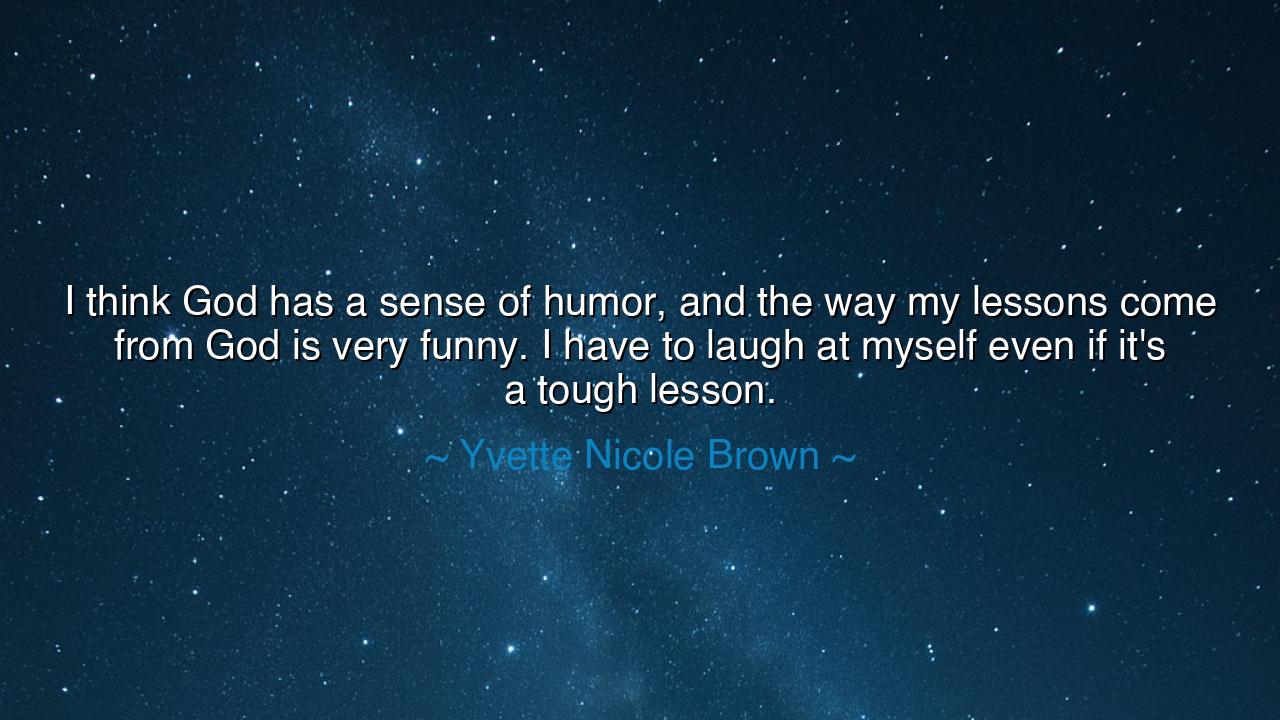
I think God has a sense of humor, and the way my lessons come
I think God has a sense of humor, and the way my lessons come from God is very funny. I have to laugh at myself even if it's a tough lesson.






In the wise and luminous words of Yvette Nicole Brown, “I think God has a sense of humor, and the way my lessons come from God is very funny. I have to laugh at myself even if it’s a tough lesson,” there is contained a deep and gentle truth about life, humility, and divine purpose. Hers is not merely the laughter of amusement, but the sacred laughter of understanding — the kind that comes when one finally sees the hidden pattern in life’s confusions. It is the laughter that follows struggle, when sorrow has been transformed into wisdom. Through her words, Brown reveals that faith and humor are not opposites, but companions on the long road toward grace.
To say that God has a sense of humor is to admit that life itself is woven with paradox. The ancient sages knew this well: that the divine often teaches not through thunder or grandeur, but through irony — through the moments when we stumble, err, and find ourselves humbled. The wise learn to see in these missteps the artistry of the Creator, who hides lessons inside what first appears as folly. Yvette Nicole Brown’s laughter, then, is not rebellion against suffering but acceptance of divine play — a way of saying, “I understand now; even in my mistakes, I was being shaped.”
Such lessons are as old as humanity. The Scriptures tell of Jonah, who fled from God’s command and ended up swallowed by the very creature that would return him to his purpose. What could be more absurd than a prophet who runs from heaven and finds deliverance in the belly of a fish? Yet within that absurdity lies the laughter of divine wisdom — the humor of a God who turns rebellion into redemption. So too in Yvette’s words we hear this echo: that the divine does not scorn our flaws but uses them to awaken us, often in ways that make us laugh at our own blindness once the truth is revealed.
There is a rare humility in being able to laugh at oneself. The proud heart resents correction; the wise heart finds joy in it. When Brown says she laughs even at her toughest lessons, she reminds us that maturity is not the absence of failure but the grace to smile through it. Life’s hardest truths, when received with laughter instead of bitterness, become stepping stones rather than burdens. The soul that can laugh at its own errors has already begun to transcend them, for laughter loosens the grip of ego and opens the heart to renewal.
Consider the tale of Socrates, who once claimed to know only that he knew nothing. When mocked for this humility, he smiled, for he understood that wisdom begins in the recognition of folly. His laughter was not derision but clarity — a lightness of spirit that allowed truth to enter. In this way, both Socrates and Yvette Nicole Brown share the same insight: that the path to enlightenment often runs through irony, and that to embrace it fully, one must be willing to find joy even in correction.
This notion — that the divine speaks through humor — also carries a message of comfort. For if God can laugh with us, then our flaws are not final. To laugh at oneself is to join that cosmic laughter, to say, “I see what You were doing, even if I didn’t understand before.” It transforms punishment into teaching, misfortune into growth. Humor, in this divine sense, is not denial of pain but redemption of it — the soul’s way of saying yes to what once seemed unbearable.
Therefore, let this teaching be remembered: when life humbles you, do not despair — smile at the lesson. When plans fail, when dreams twist into strange shapes, when the road you took turns back on itself, see if you can glimpse the divine irony within. Perhaps, as Brown teaches, it is heaven’s way of guiding you through laughter. For laughter, born of wisdom, is one of the purest forms of faith.
So live as she lives — open to the lessons, unafraid of the humor hidden within them. When you fall, laugh with the heavens; when you rise, do so with gratitude. For in the end, the soul that can laugh with God — even through tears — has found a joy that cannot be taken away. And that, perhaps, is the holiest kind of wisdom: the laughter that comes not from mockery, but from understanding the divine comedy of life itself.






AAdministratorAdministrator
Welcome, honored guests. Please leave a comment, we will respond soon